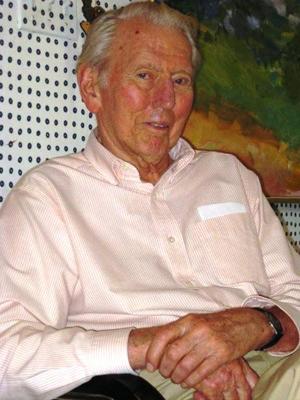Ev Shorey: Georgetown’s ‘Great Friend, Great Citizen’
By • August 22, 2013 0 1495

The obituary in the Washington Post for Clyde Everett “Ev” Shorey, who died July 23 of congestive heart failure at his home in Georgetown, tells a story of a career and a passion for the March of Dimes, the charitable organization for which he had been a top lobbyist for a number of years.
The interview with him in the Citizens Association of Georgetown’s Oral History Project in April 2010 tells the story of Ev Shorey, resident of West Lane Keys in Georgetown, where he lived with his wife of 63 years, Joan Burgess Shorey. It’s the story of Shorey, the concerned citizen of Georgetown, who committed to active service and participation in CAG and became its president for a time.
Neither story gives you a sense of the kind of impression Shorey, who was 91, could make if you met him or you watched him preside over CAG meetings.
His professional life of which a significant portion was his eight-year role as a lobbyist for the March of Dimes was surely sparked when his wife contracted Polio in 1953 at a time just before the breakthrough work of Jonas Salk bore practical results. A Yale graduate, Shorey had served in the U.S. Army Air Corps during World War II and was a graduate of Columbia Law School. He had been an attorney in his father’s Chicago law firm and came to Washington where he was deputy general counsel of the U.S. Agency for International Development.
He helped in his role as lobbyist to widen the role of the March of Dimes to include a focus on comprehensive maternal and child health care and was on the organization’s board from 1962 to 1974. He was the first head of the organization’s government affairs office. He had lobbied for such programs as the Special Supplemental Nutrition Program for Women, Infants and Children.
In Georgetown, where he and his had moved after raising their children in Cleveland Park, Shorey soon became involved in the community life of the village, his neighbors and CAG. He helped with the creation of watch and guard programs and many other issues but his contributions were more subtly evidenced in his leadership style, which was to grow the organization, persuade other Georgetown resident to take part and lead on various issues.
Both his career on the national stage and his service on CAG were about substance and style, the cheerful and graceful embrace of principled duty. Talking about the people who participated in the block captain program, he called them “great friends and great citizens.” Called a “great motivator” during his interview, he said that “you have to be convinced yourself that you can make a difference. And that it is important to get people to work together to make things happen. “
It’s fair to if you met Shorey, you were not likely to forget him. He had a certain cheerful dignity about him, a friendly curiosity. CAG meetings sometimes—not often—could get volatile or bogged down. Shorey was a great defuser, and persuader a champion of people joining and working together. He was one of those disappearing types of men—he was a gentleman. The description he made of others fits him: for Georgetown and Georgetowners, Everett “Ev” Shorey, was “a great friend, great citizen.”
Shorey is survived by his wife, Joan Burgess Shorey, four children, C. Everett Shorey III and Katherine Herold, David Shorey and Alden Lattu and seven grandchildren.

